


When Apple announced that Mac OS X 10.5 Leopard would be delayed about four months--from the end of spring in late June to late October--it cited the release of the iPhone as the main reason for the setback.
Is the release of the iPhone worth a delay in shipping the next version of Mac OS X? And Does this indicate that Apple is shifting its resources and interest away from the Mac platform?
Many Mac users anticipating the release of Leopard were disappointed to hear about its delay, after growing to expect that Leopard would ship sometime this the spring. 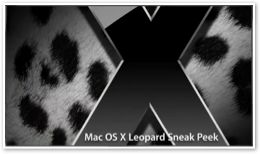

At last summer's WWDC event, Apple outlined the first real information on Leopard, not just to the public but even to its own developers.
At the January 2007 Macworld Expo, it was widely anticipated that Apple would present additional information about Leopard, and there were even rumors that Leopard would ship at or shortly after the event.
Instead, the Steve Jobs' Macworld keynote made little mention of the Leopard release, and Apple's demos of Leopard at the expo only repeated the information from WWDC and the Leopard “sneak peak” previews on the company's website. Instead, Apple introduced three new devices:
-
•the iPhone, targeted for the same late spring release as Leopard [Macworld: Ten Myths of the Apple iPhone]
Leopard, Interrupted.
Following a flurry of rumor mill articles speculating various dates for the imminent release of Leopard in March and April, one website published a report insisting that Leopard faced unexpected delays due to additional work, supposedly required to achieve compatibility with Microsoft’s new Windows Vista.
Would Apple really delay the release of Leopard out of fear that its own Mac customers would hesitate to buy the upgrade unless it attempted to cater to Vista, a product that is coasting along with little interest from either consumers or Enterprise buyers?
The invented story made no sense, but generated such a sensationalist flurry of panic that Apple released a terse response insisting that its plans had not changed, and that Leopard was still on track for a spring release.
Within a month however, Apple released a follow up notice stating that the company was delaying the final release of Leopard in order to focus on the iPhone.
Another Vista?
Interestingly however, that same announcement also said that Leopard would be released to developers in June at WWDC as a “feature complete release.”
According to Apple, Leopard will not be delayed for months of extended development, but will simply be given more time for final quality assurance work.
Compare this to the development of Windows Vista, which was not considered feature complete until early 2006, and then needed two stretches of additional QA completion: first for a symbolic release to Enterprise customers in the final months of 2006--who promptly shrugged off upgrading--and then for end users early this year.
Vista required a long QA cycle because large portions of Windows XP and Windows Server 2003 had to be rewritten to accommodate the features new to Vista. That left the product a problematic amalgamation of new, unproven code and dated old legacy code.
Apple doesn’t have to struggle with a year long QA cycle because the Mac OS X code corresponding to the complex new portions of Vista, including Microsoft’s Cocoa-like .Net and its Quartz-like Avalon/WPF, has been complete and mature for years. Leopard is an major update, not a major overhaul and retrofitting.
Apple also drags along far less legacy baggage and deals with far fewer third party complications than Microsoft must with Windows.
Vista Plans vs OS X Releases.
Back in 2001, Longhorn/Vista was initially intended to ship in 2003; it ran off that roadmap repeatedly. After starting over with a new code base in 2003, Vista skidded through three more years of broken goal posts. Work on Vista only screeched to its final resting point a full six years after it began its downhill descent.
In that same six years, Apple shipped a series of a new releases of Mac OS X, with initially a new major version about every year:
-
•Mac OS X 10.0 shipped in March 2001.
-
•Mac OS X 10.1 debuted in September 2001.
-
•Mac OS X 10.2 Jaguar shipped in August 2002.
-
•Mac OS X 10.3 Panther was released in October 2003.
After Panther, Apple announced a new 18 month development cycle for future releases. Mac OS X 10.4 Tiger was released exactly a year and a half later in April 2005. 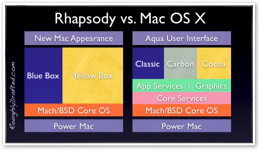

Rather than shipping another new major update 18 months later, Apple shoehorned in a new product that was not publicly anticipated prior to its surprise announcement at the 2005 WWDC: a port of Mac OS X Tiger from PowerPC to Intel. It appeared in early 2006 along with the new Intel Macs, nearly six months ahead of schedule.
Yet Another OS X.
An 18 month Mac OS X development cycle following Tiger for Intel would result in a June 2007 release.
However, once again a new Mac OS X version would delay that: the porting of Mac OS X to the iPhone's ARM architecture.
That makes the migration to Intel Macs very similar to the introduction of the iPhone: both are critical expansions of the Mac platform, not merely delays of its technical advancement.
Invisible Leopard Features.
It is uncontroversial to say that the iPhone will ship using Leopard code. While it obviously won't offer users the customer facing applications associated with the desktop version of Leopard, including Spaces and Time Machine, it will use Apple's underlying code developed for Leopard, including the updated versions of its core OS kernel and utilities, as well as its new and improved frameworks.
Earlier articles alluded to two sets of features slated for Leopard: the obvious bullet point features that give consumers compelling reasons to buy it, and the invisible features that many consumers won't ever see first hand.
These hidden features are harder for Apple to market, but actually do more behind the scenes to make Leopard more valuable to end users.
Steak, Not Sizzle.
Rather than just including a new set of flashy apps with an updated user interface, Leopard's invisible upgrades strengthen Mac OS X's stability and performance, and support new features for developers that make it easier to build and maintain applications.
Lots of Leopard buyers will upgrade primarily to get features such Time Machine, but they will benefit just as much or perhaps more from these invisible upgrades that make Leopard a more sophisticated platform overall.
That's very good news; if Apple were merely rolling shareware tools in its OS and tweaking the UI to look fresher, Mac OS X would be stuck in the same marginal upgrade limbo that held the Mac System 7 captive during the first half of the 90s and led toward the crisis of Copland.
Apple isn't just adding “wow” ornamentation and struggling to catch up with the leading OS vendors anymore, but actually blazing a leadership path in desktop operating system technology.
iPhone vs the Mac?
Does Apple's prioritizing of the iPhone over the desktop release of Leopard make sense? First, consider that Mac sales are at record highs right now. Mac sales are double the number Apple was selling just three years ago.
The release of Leopard will extend Apple's lead in operating system features, but it isn't clear that a new operating system will dramatically serve to boost Mac sales in itself.
That’s because new growth in Mac sales does not come from “new” Mac OS X features, but from the fact that users are recognizing that the Mac platform offers approachable simplicity, real world security, much less hassle with adware and junk software, and a more sophisticated, pleasant experience overall.
 Apple certainly has to work to remain competitive, but there is no immediate feature gap that desperately needs to be addressed to make Macs more attractive.
Apple certainly has to work to remain competitive, but there is no immediate feature gap that desperately needs to be addressed to make Macs more attractive. Leopard will give Apple new features to plug later in the year, but its four month delay will have no impact on today’s brisk Mac sales. That’s because few Mac buyers are likely to hold up their purchasing plans just to get Leopard bundled for free.
Postponed Sales vs Giveaway Incentives.
If anything, the Leopard delay will result in increased upgrade revenues for Apple. That's because an additional three million more Macs will ship with Tiger this year, and a large number of those users will be likely to spring for the Leopard upgrade when it does arrive.
That's the exact opposite of the problem Microsoft experienced with Vista; last winter, Microsoft had to give away advance vouchers for Vista to provide an incentive for Windows PC sales, because PCs running the six year old Windows XP were looking long in the tooth, particularly when compared to Mac OS X.
Avoiding a Zuning.
On the other hand, iPhone sales are not coasting along already; Apple has never sold a phone before, and its last foray into PDAs isn’t regarded as a success. Apple needs a tight launch of the iPhone that establishes the new device as a hot product. Assigning extra QA resources to help polish the new device is a critical step.
If Apple pushed out a problematic, disappointing product that wasn't quite ready and didn't work as expected, it would face the same impossibly difficult path as Microsoft has in relaunching the Zune after its whimpering, problematic initial rollout.
The spectacular failure of the Zune to match the hype Microsoft worked to manufacture for it forever tainted the Zune name. Microsoft also faces difficulty in redeeming the failure of its WinCE and Windows Mobile products.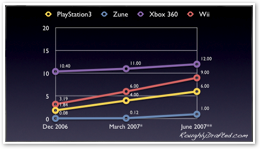

Critical First Impressions of the iPhone.
Apple only has one chance to make a first impression with the iPhone. Rivals are lurking in the shadows, hoping to find anything they can pounce upon and ridicule. Executives at Microsoft, Palm, Nokia, and rival mobile service providers have already come out in full force with predictions of doom for the iPhone.
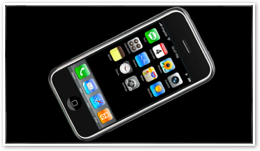 They all lack the luxury of ignoring Apple's new phone, and are certainly not going let any opportunity to complain about the iPhone pass them by. Microsoft's Steve Ballmer can't seem to stop talking about the iPhone. Of course, a big part of that is because the press won't stop asking him about it.
They all lack the luxury of ignoring Apple's new phone, and are certainly not going let any opportunity to complain about the iPhone pass them by. Microsoft's Steve Ballmer can't seem to stop talking about the iPhone. Of course, a big part of that is because the press won't stop asking him about it.iPhone is the New Mac.
Focusing its efforts on the iPhone release is therefore not only practical and prudent, but also critical for Apple's success. While Leopard might help to boost new Mac sales to an extent, the iPhone will expand the Mac platform dramatically.
That's because the iPhone really is a Mac, running the same Mac Cocoa application frameworks and using the same Mac core OS. Apple seems careful to distinguish the two, but that may be a mistake. It seems that Apple should try to impress users that both run the same software, following the same "Windows Everywhere" branding that Microsoft has long tried to market. 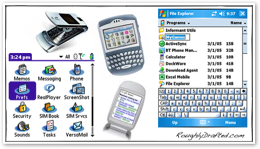

Unlike Windows Mobile phones, which on a technical level don't run a version of Windows that is at all closely related to the desktop version of Windows, the iPhone really is a clean subset of the Mac desktop.
iPhone: Don't Call Me a Mobile Mac.
Apple's careful delineation between the two, to the point of apparently even dropping the "Mac" from "OS X" when referring to the iPhone's operating system, must be based on the fear of associating the device with a computer and thereby alienating potential consumers.
It's not hard to understand why Apple might be being cautious in positioning the iPhone.
Given the abject failure of Microsoft's Handheld PC, Pocket PC, Ultra Mobile PC, and Tablet PC devices over the last decade, it makes sense for Apple to portray the iPhone as a sophisticated mobile rather than another handheld computer.
Apple also seems loath to associate the iPhone to the John Sculley-era Newton. Even so, that doesn't change the fact that the iPhone isn't just an iPod or a phone, but really is a mobile, handheld Mac.
Millions of New Macs.
As a mobile Mac, the iPhone will jolt shipments of Mac units this year and next--even if Apple doesn't want to officially call it a Mac.
Last year, Apple sold 5.3 million desktop Macs, and is on course to sell around 6 million this year. Sales of the iPhone, along with the Apple TV, will bump up the number of devices running Mac OS X dramatically.
If Apple meets its 10 million goal for the iPhone by the end of 2008, and meets expectations of Wall Street on the Apple TV, Mac OS X units will jump from 5.3 to more than 12 million this year, and around 18.5 million in 2008.
That's a phenomenal increase in the Mac platform that absolutely nobody predicted. It will help subsidize ongoing development of Mac OS X and expand the market for developers proficient in Apple’s Cocoa development tools.
Walking Before Running.
Rather than being a simple delay for Leopard, the iPhone will actually serve as a test deployment of it, allowing Apple to test the core functionality of Leopard before introducing third party developer variables and the wide open upgrade scenarios that desktop Macs present.
Apple has long floated experimental efforts that were used to develop new products. Remember when the company set up an extensive website of QuickTime movie trailers? Apart from creating some interest among users to download QuickTime, the free service didn't seem to make much sense financially.
Apple certainly wasn't making any revenue from offering up free trailer downloads, and was certainly not paying for its bandwidth from a few $30 QuickTime Pro upgrades. Apple wasn’t just providing a free service however; it was learning how to do online media distribution, which would later be very valuable to the iTunes Store.
What about those low quality iTunes TV shows that puzzled analysts? It was an experiment in serving up video sales on demand; it later expanded to provide higher quality movies, once Apple delivered a device practical for viewing them.
Today’s free HD movie trailers? Apple is again experimenting with the technology required to efficiently serve up high quality content, and appears poised to soon start offering HD video content to Apple TV users.
The Name of the Game.
And what about iPod games? Did Apple really roll out a simple gaming platform for the iPod to make big bucks on $5 games? It seems far more likely that the company is really testing the secure deployment of device software online, something that will be critical to the success of the iPhone. 

Apple's most recent iPod game release is the 99 cent iQuiz, which seems designed to test the waters to determine how many users will buy games priced at $1 versus $5.
The Truth is Stronger than Fiction.
All of this seems to make it very clear that those naysayer pundits--who are quick to suggest that the Mac platform is shriveling up and that Apple is desperately striking out into new consumer electronics products just to stay alive--are simply misinformed or are intentionally presenting false information.
The Mac platform is growing dramatically on its own, and Apple's new efforts in consumer electronics are only helping that growth.
The iPhone, rather than being a thorn in the side of Leopard development or weighing it down with endless delays, is in really an integral part of Apple's overall strategy to expand and improve upon its Mac platform. The shift in priorities will result in both the iPhone and Leopard being better products.
That’s very good news for Mac users.
Like reading RoughlyDrafted? Share articles with your friends, link from your blog, and subscribe to my podcast!
Next Articles:
This Series

Haloscan Q107
What Does Prioritization of the iPhone Mean for Leopard?
Wednesday, May 9, 2007

Ad



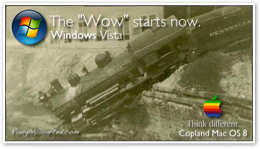

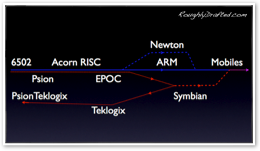







 Bookmark on Del.icio.us
Bookmark on Del.icio.us Discuss on Reddit
Discuss on Reddit Critically review on NewsTrust
Critically review on NewsTrust Forward to Friends
Forward to Friends
 Get RSS Feed
Get RSS Feed Download RSS Widget
Download RSS Widget





